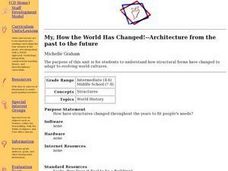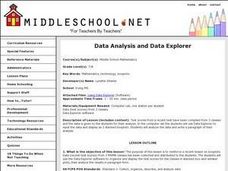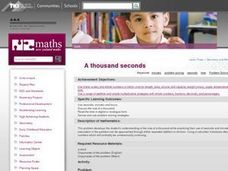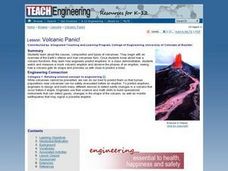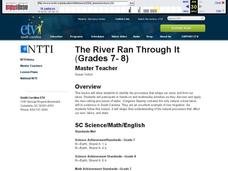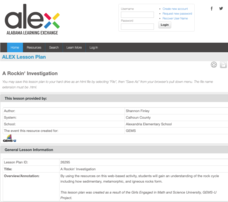Curated OER
Number Sense Sampler
First graders illustrate a math problem with counters while reading story books, such as Margie Burton's "Add the Animals". They demonstrate a positive learning attitude toward mathematics and communicate clearly in oral, artistic,...
Curated OER
Comparing Notes: a Mathematical Exploration of the Piano
Young scholars examine the history of equal temperament, the modern standard of tuning a piano. Proportion calculations of octaves and perfect fifths are utilized to calculate the frequency of each note in a major scale.
Curated OER
My, How the World Has Changed!--Architecture from the past to the future
Learners explore how structural forms adapt to evolving world cultures. In groups, students examine posters from the past and write about the picture. Learners make predictions about what the picture will look like in the future....
Curated OER
Measurement
First graders participate in various activities dealing with measurement, length, volume, and temperature. They identify the need for standard units of measure, sort and classify objects, measure distances, and use a thermometer.
Curated OER
Data Analysis and Data Explorer
Students use the Data Explorer software to organize and display the test scores for the classes in stacked box-and-whisker plots, then analyze the results in paragraph form.
Curated OER
Investigating the Idea of Cos
Fifth graders use cos to solve problems involving right-angled triangles. They solve equations of the form cos(++) = a, for a between -180 and 360 degrees. They state the value of cos(++) in special cases and graph y = cos(++).
Curated OER
Sonic Booms and Logarithms
High schoolers practice working with the symbolic notation for logarithms. They understand various types of patterns and functional relationships. They use symbolic forms to represent and analyze mathematical situations.
Pennsylvania Department of Education
Seeing Doubles
Students work with dominoes to recognize the number of spots on each side as they relate to addition facts. In this seeing doubles lesson, students make triangle shaped flash cards for the double facts. Students represent the correct...
Curated OER
You Can Count on Squares!
Fourth graders engage in and explore to develop mathematical, specifically algebraic, ideas. Although the tasks are built around measurement, they are algebraic to the extent that they require 'formulae' to be derived form the geometric...
Curated OER
A thousand seconds
Pupils use seconds, minutes, and hours. They then discuss the size of a thousand. After that they read time in digital or analogue form.
Curated OER
Heavy: The Story of Metal (Part 2)
Students discuss censorship of music and other art forms. Students create their own list of criteria for acceptable music. Students write a list of their own "Filthy fifteen" based on their criteria for acceptable music.
Curated OER
Surfing to the Planets on the Internet
Seventh graders explore the planets using computers and other forms of electronic technology. They research data on two planets and compare the data. Students make conclusions regarding the size of their planets. They calculate how long...
Curated OER
Equality For All
Young scholars complete worksheets on equality in math and create their own. They further investigate equality in the world around them.
Pennsylvania Department of Education
Tangram Challenges
Learners explore geometric concepts by working with Tangram Puzzles. In this Tangram challenge lesson plan, students use problem-solving tasks that involve physical manipulatives. Learners select a picture and use all seven...
Curated OER
One Square Meter
Students examine various ecosystems using scientific inquiry. Using the local area, they assess the characteristics and conditions in one square meter. They report their findings in the form of a survey map and data sheet. They...
Curated OER
Tessellations
Fifth graders investigate the relationship between math and art by examining patterns and polygons.They examine how polygons make up the patterns that form tessellations, and determine tessellations that occur in nature. Finally, they...
Curated OER
Making Rectangles
Students study rectangles. In this math instructional activity, students use numbers, measurements and geometry to draw rectangles of varying sizes.
Curated OER
Tornado!: Types and Formation
Students discuss the different types of tornadoes and how they form. Working in groups, they record journal entries by conducting experiments with water bottles simulating vortex formation.
Curated OER
Volcanic Panic!
Students begin with an overview of the Earth's interior and how volcanoes form. They learn how engineers predict eruptions. In a class demonstration, students watch and measure a mock volcanic eruption and observe the phases of an...
Curated OER
The River Ran Through It
Young scholars identify the processes that shape our rivers and form our lakes. They participate in hands-on and multimedia activities as they discover and apply the river-cutting processes of water.
Curated OER
Parabolic Paths
High schoolers investigate properties of parabolas. For this algebra lesson, students identify the different paths of a parabola. They use the navigator to make observations of the parabola.
Curated OER
Tornado!
Students examine the characteristics and types of tornadoes. They discuss how they are formed, conduct an experiment with two liter bottles, analyze data and determine mean and median, and design a house to withstand tornado-force winds
Curated OER
Integration By Substitution
Young scholars calculate the solution using integrals in this calculus lesson. They use the TI to create a visual of how to compute integrals. Learners also use substitution by integration and all its properties.
Alabama Learning Exchange
A Rockin' Investigation
Young scientists identify the rock cycle. In this earth science activity, students participate in web-based research to understand how sedimentary, metamorphic, and igneous rocks form. As a follow-up, they collect various rocks and...


